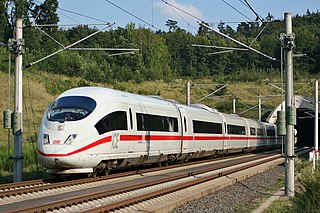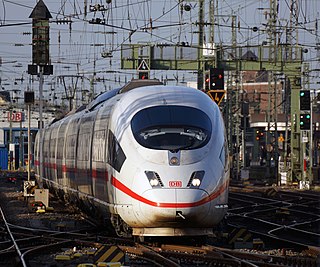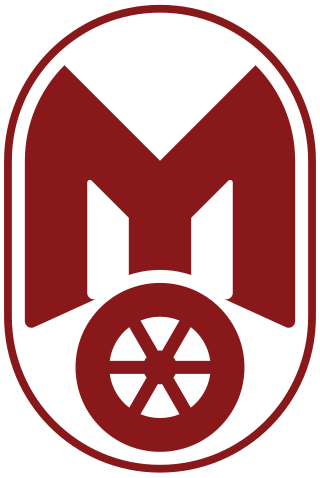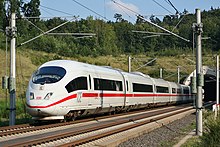The Deutsche Bahn AG is the national railway company of Germany, and a state-owned enterprise under the control of the German government. Headquartered in the Bahntower in Berlin, it is a joint-stock company (AG) and the largest railway company in the world.

Intercity Express is a high-speed rail system in Germany. It also serves destinations in Austria, France, Belgium, Switzerland and the Netherlands as part of cross-border services. It is the flagship of the German state railway, Deutsche Bahn. ICE fares are fixed for station-to-station connections, on the grounds that the trains have a higher level of comfort. Travelling at speeds up to 300 km/h (190 mph) within Germany and 320 km/h (200 mph) when in France, they are aimed at business travellers and long-distance commuters and marketed by Deutsche Bahn as an alternative to flights.

As of 2021, Germany had a railway network of 33,399 kilometres (20,753 mi), of which 20,540 kilometres (12,760 mi) were electrified and 18,556 kilometres (11,530 mi) were double track. Germany is a member of the International Union of Railways (UIC). The UIC Country Code for Germany is 80.

Frankfurt am Main Airport long-distance station is a railway station at Frankfurt Airport in Frankfurt, Germany. It is served by long-distance trains, mostly ICE services running on the Cologne–Frankfurt high-speed rail line. It is the largest railway station serving an airport in Germany with about 23,000 passengers each day. The station is served by 210 long-distance trains daily, of which 185 are Intercity-Expresses. It and Limburg Süd station are the only railway stations in Germany that are served exclusively by long-distance trains.
DB Regio AG is a subsidiary of Deutsche Bahn which operates regional and commuter train services in Germany. It is a 100% subsidiary of the Deutsche Bahn Group and there part of the DB Regio business segment, which also includes DB Regionnetz Verkehrs GmbH and other independent subsidiaries headquartered in Frankfurt am Main.

Mitropa was a catering company best known for having managed sleeping and dining cars of different German railways for most of the 20th century. Founded in 1916, the name "Mitropa" is an abbreviation of Mitteleuropa. The railway carriages displayed a distinct burgundy-red livery with the Mitropa logo.

The ICE 1 is the first batch-produced German high-speed train and one of six in the Intercity Express family. Revenue service at speeds up to 250 km/h (155 mph) started in 1991. It was raised to 280 km/h (175 mph) in May 1995 and temporary reduced to 250 km/h (155 mph) again, as a result of the Eschede accident.

The Hanover–Würzburg high-speed railway is a double-track, electrified high-speed railway between Hanover and Würzburg in Germany, 327 kilometres (203 mi) in length. The line, built between 1973 and 1991, was the longest contiguous new project constructed by Deutsche Bundesbahn. The total costs were almost DM 11.9 billion.

Würzburg Hauptbahnhof is a railway station for the city of Würzburg in the German state of Bavaria. It was opened in 1864 to the north of the inner city as a replacement for the former Ludwigsbahnhof in the city centre, the capacity of which had been exhausted by the dramatic increase of rail traffic. Even today, Würzburg station is one of the major stations in Bavaria, since it lies at the intersection of several heavily used rail corridors. In particular, the routes in the north–south direction from Hamburg and Bremen to Munich as well as in west–east direction from the Rhine-Ruhr and Rhine-Main to Nuremberg and Vienna. Apart from Aschaffenburg Hauptbahnhof, Würzburg is the only station in Lower Franconia to be served by Intercity-Express services. With its combination of rail, tram and bus services, the station is the main hub for public transport in the city and the district of Würzburg.
City Night Line, abbreviated CNL, was a train category of German railway company Deutsche Bahn for overnight passenger train services between Germany and neighbouring European countries. In late 2015, Deutsche Bahn announced that it planned to terminate all night train services in December 2016, and this plan was implemented on 11 December 2016. The service on some CNL routes was replaced by ÖBB Nightjet services.

The Nuremberg–Ingolstadt high-speed railway is a 78-kilometre-long (48 mi) high-speed railway running between the cities of Nuremberg and Ingolstadt in Bavaria, Germany. It branches off the Nuremberg–Regensburg railway and runs parallel to the A9 Autobahn to Ingolstadt, where it joins the Munich–Treuchtlingen railway at Ingolstadt Nord station.

Metropolitan was the brand name of a German premium passenger train service between the cities of Cologne and Hamburg. Meant as an alternative to air transport, the first-class-only trains were operated from 1 August 1999 until 11 December 2004 by the Metropolitan Express Train GmbH based in Bad Homburg, a wholly owned subsidiary of the DB Fernverkehr wholly owned subsidiary of Deutsche Bahn AG.

The DBAG Class 605, commonly known as the ICE TD is a high-speed diesel multiple unit (DMU) train, formerly in service with Deutsche Bahn and DSB. It was retired from active passenger service in 2017 after years of operational issues with one trainset being kept and repurposed as a technology testbed.

DB AutoZug GmbH was a German rail transport company that provided automobile (Motorail) and night passenger train services for Deutsche Bahn AG. It was based in Dortmund and was a wholly owned subsidiary of Deutsche Bahn AG. On 30 September 2013 the company was merged into DB AG's long-distance division DB Fernverkehr.

The Berlin–Halle railway, sometimes called the Anhalt railway, is a twin-track, electrified main line found in the German city and state of Berlin, and the states of Brandenburg and Sachsen-Anhalt. The railway was originally built and managed by the Berlin-Anhaltische Eisenbahn-Gesellschaft.

Intercity, often shortened to IC, is the second-highest train classification in Germany, after the Intercity Express (ICE). Intercity services are locomotive-hauled express trains, usually over long-distances. There are Intercity routes throughout Germany and routes generally operate every other hour, with multiple routes giving a more frequent service on core routes. Intercity services are operated by the DB Fernverkehr division of Deutsche Bahn, Germany’s national railway.

ICE 4 is a brand name for long-distance Intercity-Express high-speed trains being procured for Deutsche Bahn.

The Karwendel is an international named express train service between Germany and Austria. The train was named after the Karwendel mountain range forming the German-Austrian border south of Garmisch-Partenkirchen, which it passes on the Mittenwald Railway (Karwendelbahn). Introduced in 1930, it is currently labelled as an Intercity-Express train connection operated by Deutsche Bahn AG.
Intercity 2, abbreviated as IC2, refers to DB Intercity trains formed of double-deck rolling stock. Such trains were first introduced by Deutsche Bahn Fernverkehr in December 2015 to replace its aging IC coaches.

ICE L is a long-distance locomotive-hauled push-pull train which is being built by the Spanish company Talgo for the German train operator DB Fernverkehr and is scheduled to commence operation from 2025. The name of the train was changed in 2021 from its previous working title ECx, with the L standing for low-floor entry. The trains form part of the manufacturer's Talgo 230 family of trains. The Talgo Travca locomotives ordered for the service are designated DB Class 105. They will replace old Intercity (IC) trains in Germany.


















